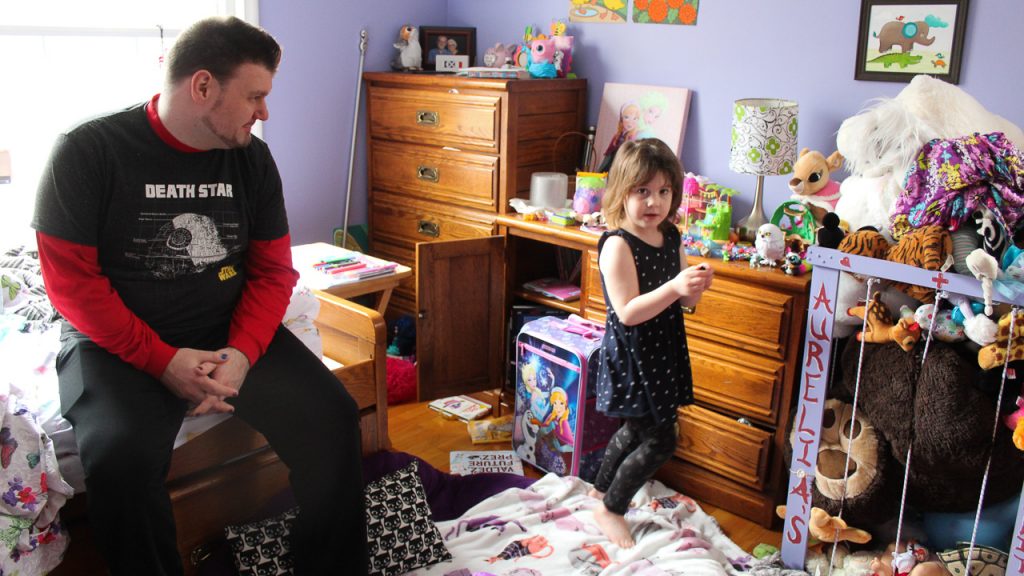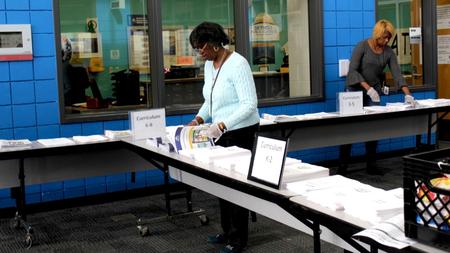Home For Weeks, Families Adjust to New Reality
Parents, kids, caregivers and educators are facing increased challenges in metro Detroit as schools and much of public life are shut down to blunt the spread of coronavirus.

Just two days after Michigan confirmed it’s first two cases of COVID-19, Governor Gretchen Whitmer announced she’d be closing all K-12 schools in the state. Yesterday, Whitmer issued a “stay at home” order, temporarily closing non-essential businesses and asking Michiganders to remain at home unless out for essential survival needs like groceries, healthcare and taking care of the elderly.
WDET’s Laura Herberg and Sascha Raiyn report on how parents, children, caretakers and teachers are all finding new ways to cope with the closure schools.
Home For Now: Families Adjust to a New Reality Under Coronavirus

A group of boys – ages 9 though 14 – are playing basketball on an outdoor court next to Spain Elementary-Middle School in Detroit.
The boys have recently learned that they’ll be out of school at least until April 6th (a date that has since been extended to April 13th). Coronavirus, and it’s resulting disease COVID-19, have dominated the news, and these kids are aware of the situation.
“I don’t care that school’s out, but this is nasty, how people are because of this corona!” says one older boy.
“People be carrying this coronavirus at school and we just don’t know,” says another.
“That’s triflin’ because people don’t wash they hands after theyself,” says a third boy.
“You almost feel like you have to be two places at once. I think being stuck in the house, and the cabin fever, that’s going to make it difficult.” — Kristin Homuth, parent
One of the boys makes the coronavirus sound kind of like the Boogie Man: “If the coronavirus comes here, I’m gonna stay in the house,” he says. “And keep the window closed.”
While staying home and social distancing is thought to slow the spread of the virus, keeping windows closed won’t actually help. But then again, these are kids trying to make sense of a pandemic, and they’re not the only ones figuring this out as it happens.
Working, and Parenting, From Home
Brad Homuth teaches high school history at University Liggett School in Grosse Pointe Woods. He spent the morning juggling watching his 5-year-old daughter, Aurelia, and his 8-month-old son, Kal.
It’s a “a little bit stressful to try to give both kids as much attention as I can.” — Brad Homuth, parent

“Sometimes she and I want to do something together or she and I really want to do an activity and I’ve got to feed him or I’ve got to change him or he needs attention right away.” Brad says. “That makes it a little bit stressful to try to give both kids as much attention as I can.”
In the coming weeks Homuth will have help from his wife, Kristin. But Kristin says she thinks it will be hard to work and watch the kids even when both she and her husband are home full time.
“You almost feel like you have to be two places at once,” Kristin says. “I think being stuck in the house, and the cabin fever, that’s going to make it difficult.”
She thinks parents, and other adults, shouldn’t be too hard on themselves for not being perfect during a crisis.
“I think that everyone is just doing the best that they can and we have to be kind to ourselves and realize that everyone is in this situation where we don’t know what’s going to happen.”
Trusted, accurate, up-to-date
WDET is here to keep you informed on essential information, news and resources related to COVID-19.
This is a stressful, insecure time for many. So it’s more important than ever for you, our listeners and readers, who are able to donate to keep supporting WDET’s mission. Please make a gift today.
Finding Help
Some parents have managed to find childcare assistance. Whitmer’s “Stay At Home” executive order allows childcare centers to offer services for essential workers who can’t stay home with their kids.
Kiara Smith is the owner of a holistic home childcare center called Kreative Buttercups. After the schools closed, she posted on Facebook that she’d be offering childcare for just $15 a day per child, more than half off what she normally charges. She even said if someone couldn’t afford $15, she would still be willing to watch their child.
“Even if I could help one parent in this time of need by providing them with safe childcare, then I’ve served my purpose.” — Kiara Smith, Kreative Buttercups
“A few people commented on my post to express their concerns,” Smith says. “People stated that providing childcare defeats the purpose of the schools being closed.”
Smith says the $15 a day per child fee is just enough to cover the cost of lunch, dinner and snacks that she provides. She’s essentially just breaking even but she wanted to help.
“These people would still need help,” Smith says. “We’ve all seen news stories of people leaving their kids in unsettling situations just so they could go to work to provide for them. People go into panic mode and do whatever they can to stay ahead of the problem.”
“So even if I could help one parent in this time of need by providing them with safe childcare, then I’ve served my purpose.”
A Deepened Divide

Getting reliable, quality childcare is a high priority for any family, but low-income parents may face a tougher challenge with schools out.
At Mackenzie Elementary-Middle School in Detroit workers grab meals to hand to families waiting outside in their cars. Pick-up sites like this one began operating at 58 district locations on March 18,
but due to the Governor’s “Stay At Home” orders they’ve since been reduced to 17 locations, and Mackenzie is no longer one of the sites.
“So when you have a crisis like this that inequity and that gap shows itself even clearer.” — Superintendent Dr. Nikolai Vitti, Detroit Public Community School District
These grab-n-go sites offer a way for kids who depend on school for breakfast and lunch to still eat while facilities are closed. Parents can also pick up paper curriculum packets at these sites for students to work on while the schools are closed.
“There are online platforms available for students from kindergarten through 12th grade, but we know because of the ‘digital divide’ not all families have access to a device or more importantly internet access,” says Detroit Schools Superintendent Dr. Nikolai Vitti.
He worries this deepened divide and school suspension will exacerbate other educational challenges.
“The day-to-day support at the home isn’t there – not because parents don’t care about their children, it’s just based on their own experiences educationally, their own socioeconomic realities,” Vitti says. “They’re just not able to play that kind of consistent role that you see in more middle-class, upper-middle-class families.”
“So when you have a crisis like this that inequity and that gap shows itself even clearer.”
